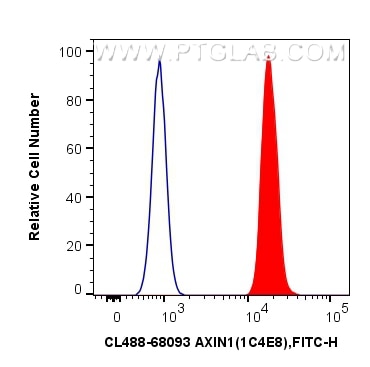Anticorps Monoclonal anti-AXIN1
AXIN1 Monoclonal Antibody for FC (Intra)
Hôte / Isotype
Mouse / IgG1
Réactivité testée
Humain, rat, souris
Applications
FC (Intra)
Conjugaison
CoraLite® Plus 488 Fluorescent Dye
CloneNo.
1C4E8
N° de cat : CL488-68093
Synonymes
Galerie de données de validation
Applications testées
| Résultats positifs en FC (Intra) | cellules A431 |
| Résultats positifs en cytométrie | cellules A431 |
Dilution recommandée
| Application | Dilution |
|---|---|
| Flow Cytometry (FC) (INTRA) | FC (INTRA) : 0.40 ug per 10^6 cells in a 100 µl suspension |
| Flow Cytometry (FC) | FC : 0.40 ug per 10^6 cells in a 100 µl suspension |
| It is recommended that this reagent should be titrated in each testing system to obtain optimal results. | |
| Sample-dependent, check data in validation data gallery | |
Informations sur le produit
CL488-68093 cible AXIN1 dans les applications de FC (Intra) et montre une réactivité avec des échantillons Humain, rat, souris
| Réactivité | Humain, rat, souris |
| Hôte / Isotype | Mouse / IgG1 |
| Clonalité | Monoclonal |
| Type | Anticorps |
| Immunogène | AXIN1 Protéine recombinante Ag10079 |
| Nom complet | axin 1 |
| Masse moléculaire calculée | 826aa,92 kDa; 862aa,95 kDa |
| Poids moléculaire observé | 110-120 kDa |
| Numéro d’acquisition GenBank | BC044648 |
| Symbole du gène | AXIN1 |
| Identification du gène (NCBI) | 8312 |
| Conjugaison | CoraLite® Plus 488 Fluorescent Dye |
| Excitation/Emission maxima wavelengths | 493 nm / 522 nm |
| Forme | Liquide |
| Méthode de purification | Purification par protéine G |
| Tampon de stockage | PBS with 50% glycerol, 0.05% Proclin300, 0.5% BSA |
| Conditions de stockage | Stocker à -20 °C. Éviter toute exposition à la lumière. Stable pendant un an après l'expédition. L'aliquotage n'est pas nécessaire pour le stockage à -20oC Les 20ul contiennent 0,1% de BSA. |
Informations générales
Axis inhibition protein1 (AXIN1), also called AXIN, together with AXIN2 are multidomain scaffold proteins that negatively regulate Wnt signaling. AXIN1 is likely to function as a tumor suppressor. Under UV irradiation, AXIN1-HIPK2-TP53 complex forms. The complex also controls cell growth, apoptosis and development. Like AXIN2, AXIN1 undergoes poly(ADP-ribosy)lation by tankyrase TNKS and TNKS2 followed by unbiquitination by RNF146 which leads to its degradation and subsequent activation of Wnt signaling. Its deubiquitination by USP34 is important for nuclear accumulation during Wnt signaling. Proteintech's AXIN1 antibody 16541-1-AP is a rabbit polyclonal antibdy raised against the N-terminus of human AXIN1.


